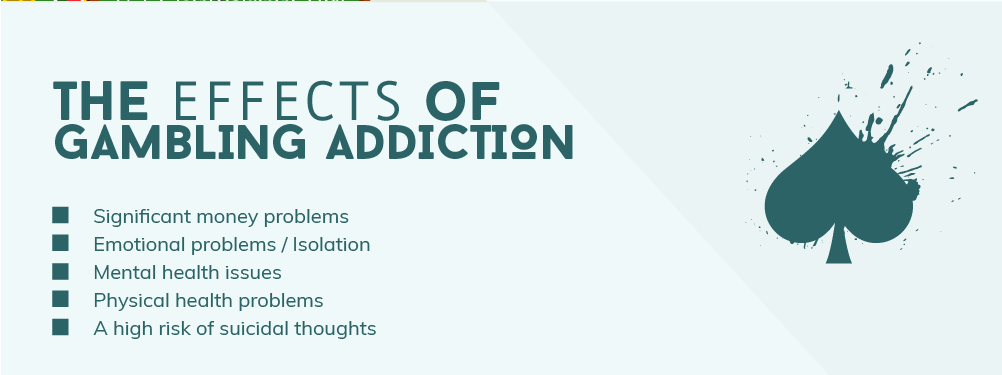What Causes Gambling Problems
Gambling problems are a worldwide issue as roughly 2.3 percent of the population suffers from this behavior. Previous research has shown that people with gambling problems suffer from a range of. That’s because studies have shown that sleep deprivation is linked to diminished self-control and riskier decision-making – two main components of problem gambling. Additionally, online gambling may, itself, cause sleep deprivation – which can lock players into an unhealthy cycle. Facts and myths about gambling problems. Myth: You must engage in gamble activities every day to be called a problem gambler. Fact: A person who is a problem gambler may gamble often or infrequently. No matter how regular or irregular your gambling is, it’s a problem if it causes you problems.
- What Causes Gambling Problems Affect
- What Causes Gambling Problems Involving
- What Part Of The Brain Causes Gambling Problems
Most gamblers lose. So why do people bet their hard-earned money? Find out a bit about the psychology of gambling, why people bet money and the reasons for gambling.

Psychology of Gambling: Reasons for Gambling
Ok, so we all understand that gambling offers you the chance of winning money or prizes, but have you considered some of the other reasons for gambling? A look into the psychology of gambling offers insight into that question.
Why Do People Gamble? - Risk Taking
One of the reasons for gambling is that it's human nature to feel excited when taking risks and the positive feeling gained from gambling is no different. 'Will my numbers come up?' 'Will my team win?' The sense of anticipation creates a natural high, an adrenalin rush, a feeling that very many of us seek when looking for fun and entertainment. A feeling that some people believe they cannot live without.
Why Do People Gamble? - Escapism
The gambling environment can provide an escape from everyday life. Whether it be the glitzy casino environment, a loud and exciting amusement arcade or even an online betting company, for the time that we are taking part we can be surrounded by different people, different sounds and emotions, all of which stimulate and arouse our senses.
Why Do People Gamble? - Glamorous
The media and advertising agencies understand the psychology of gambling and often portray a stylish, sexy, fashionable image of gambling. In film and TV, we see characters enjoying a night at the casino or an afternoon at the races. There is often a suggestion of 'high society' and attending at 'a place to be seen'.
Why Do People Gamble? - Social
Gambling is accepted as part of this country's culture and as such is widely participated in (with varying frequency) by the majority of the population. Some young people are introduced to gambling by learning to play card games with their parents at home, maybe we go the bingo with friends on a Friday night or meet after school at the amusement arcade.
Psychology of Gambling: The Common Misperception


The above reasons for gambling all tie into this: most people think about gambling as a low-risk, high-yield proposition. In reality, it's the opposite: a high-risk, low-yield situation. The odds always favor the house. Despite that, the thought and excitement of hitting a casino jackpot are often too alluring - regardless of its probability.
Learn more about Types of Gamblers and Signs of Gambling Addiction.
Sources:

- Illinois Institute for Addiction Recovery
next: What Type of Gambling is the Most Addictive and Why?
~ all gambling addiction articles
~ all articles on addictions
APA Reference
Gluck, S. (2008, December 29). Psychology of Gambling: Why Do People Gamble?, HealthyPlace. Retrieved on 2020, December 15 from https://www.healthyplace.com/addictions/gambling-addiction/psychology-of-gambling-reasons-for-gambling
What is gambling addiction?
Gambling refers to an activity in which a person risks something valuable to them in order to win something in return. Common forms of gambling include betting in casinos or on sporting events.
Gambling disorder describes a loss of control of gambling behavior that causes significant problems with finances, work, or personal relationships. Sometimes it is also called compulsive gambling or problem gambling. People with a gambling disorder are unable to control their gambling activities.
How common is gambling addiction?
Compulsive gambling affects an estimated two to four percent of the population in the United States.
What causes gambling addiction?
An uncontrollable desire for the rush or excitement of winning can lead to compulsive gambling. There is no known cause for this disorder. In some cases, the condition runs in families.
What are the symptoms of gambling addiction?
What Causes Gambling Problems Affect

What Causes Gambling Problems Involving
Signs of gambling addiction include:
What Part Of The Brain Causes Gambling Problems
- Thinking about gambling more often; having a craving for gambling that grows in intensely
- Gambling money or possessions you don’t have
- Needing to make bigger bets more often to achieve the rush of excitement
- Becoming irritable or restless when trying to stop or slow down gambling
- Chasing losses (gambling after losing money to win back the loss)
- Continuing to gamble even when it negatively affects finances, work, or personal relationships
- Lying to keep gambling activity secret
- Difficulty controlling gambling activity
- Gambling when feeling anxious or agitated or to manage other uncomfortable feelings
- Seeking financial assistance from others due to money problems from gambling